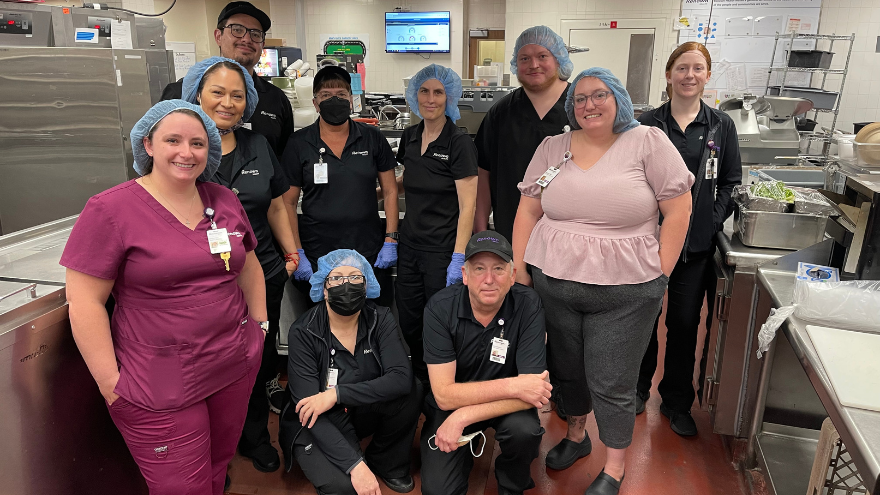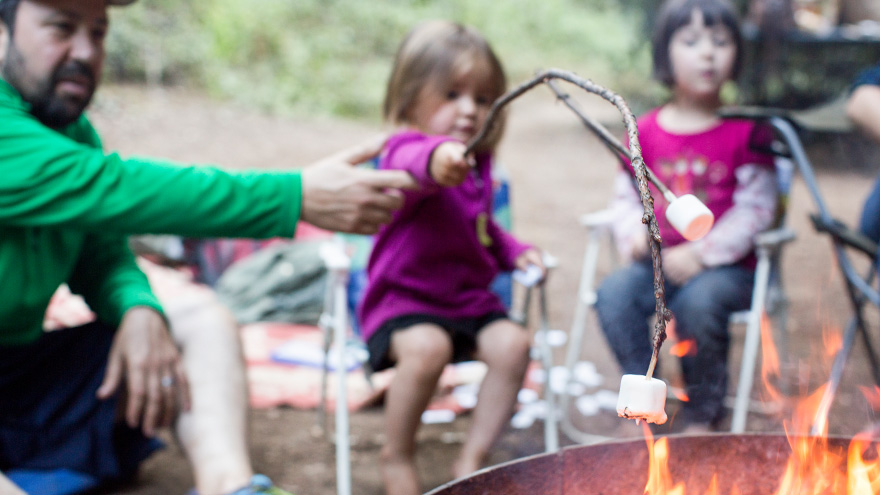Search
-
Bye-Bye Holidays, Hello Routines! Getting Kids Back into the Groove
The kids are back in school and the holidays are all but a distant memory: Now what? Karen Wagner, APRN, offers specific tips about getting kids back to their routines in the post-holiday-hustle-and-bustle. Are you finding the kids struggling with bedtime routines? Having trouble getting them to tackle homework? There’s a simple reason: The holidays messed with their mojo! Here, we talk with Nurse Practitioner Karen Wagner about what to do to get them back on the straight and narrow. Why Routines Are Important “Holidays are a fantastic time to get together with family and friends, so our routines are usually off — and this is understandable, “Wagner says. “While the holidays are exciting, they are chaotic and can put our kids out of the routines.” So how do you get kids back into those routines they crave? “Consistency/routines are crucial for our kids,” she says. “Most people — kids and adults — experience a let-down feeling after the holidays, and post-holiday adjustment takes time.” So what can we do, specifically? Wagner recommends the following: Re-establish family routines, including before- and after-school programs or child care routines. Once kids are back on the regular schedule, they’ll find that sense of familiarity as the old routine returns. But keep in mind, this won’t happen overnight. Encourage healthy eating, as the upheaval of their schedule can be offset by a balanced diet. Make sleep time a priority: Keep in mind that it might take up to three nights of strict bedtime to get them back on track. But enforcing normal bedtime will get their bodies back on a normal schedule. Return to usual chores and expectations. Nothing encourages a return to routine like reminding them of the basics. Incorporate indoor and outdoor time. They likely spent lots of time outdoors during our unseasonably warm winter break — and they even had a snow day or two! So encouraging both indoor and outdoor time will help them return to a circadian rhythm and tire them out from exposure to fresh air. “It is never too early to encourage a love for physical activity in kids by exposing them to fun fitness activities and sports,” Wagner says. “Physical activity improves bone health, cardiorespiratory and muscular fitness, decreases levels of body fat, reduces symptoms of depression, and improves cognitive skills and the ability to concentrate.”
Read More About Bye-Bye Holidays, Hello Routines! Getting Kids Back into the Groove
-
Department Spotlight: Food & Nutrition Services
Nutrition is a vital aspect of patient care. At Renown Health, the Food & Nutrition Services (FNS) teams take their mission of delivering patients high-quality, cost-effective, nutritious and attractive foods to the next level. From a thrice-daily trayline service with a wide variety of delicious food to the personalized dietitian services that ensure every patient gets the nutrients they need for optimal healing and recovery, Renown’s FNS teams at Regional, South Meadows and Rehab are unmatched. Food for the Good Fight The hustle and bustle of early morning food preparations gears the FNS team up to, as Renown Regional Food Service Worker Molly Kalsman puts it, “provide patients with adequate nutrition to heal.” From morning until nighttime, the team prepares three meals a day along with late trays and snacks. This isn’t your run-of-the-mill hospital food, either. Think anywhere from cheeseburgers and salads to pork roasts and baked potatoes. As you can imagine, food of this caliber requires all hands on deck in the kitchen, especially during trayline times, to ensure all patients receive quality meals that meet their individual nutrition needs. “We make an impact with good service and great food,” said Mario Nunez, a Food Service Worker at Renown South Meadows. As the food service workers are hard at work cooking and assembling, the nutrition representatives visit each patient to learn their individual dietary restrictions, allergies and food preferences. For Julie Macaluso, Nutrition Representative at Renown South Meadows, “letting the patients choose their meals” is one of the highlights of her job. “We go over meal choices for their stay, so the patient can pick out something they would like to eat and find enjoyable,” added Tara Sprehe, Nutrition Representative at Renown Regional. The immense care and attention our nutrition representatives give to every patient paves the way for our clinical dietitians to build a nutrient-dense diet plan based on the individual patient’s preferences. Dietitians are the only licensed providers that can leverage nutrition to treat, manage and prevent illness and disease to improve patient outcomes. Every day, our experienced dietitians “make recommendations in the adjustment of macro and micronutrients in order to best manage a person’s health status in the setting of trauma, diabetes, heart disease and other morbidities,” said Jessica Blauenstein, a Registered Dietitian and Board-Certified Specialist in Oncology Nutrition at the William N. Pennington Cancer Institute. Overall, for this department, the phrase “that’s not my job” will never be heard, according to Lupe Ayala, a Cook at the Renown Rehabilitation Hospital. Day-in and day-out, it’s a massive group effort – and that’s the way they like it. Setting the Service Bar High Hitting milestones and accomplishments comes naturally to this crew. The FNS team sets the bar incredibly high for food and service standards across the Renown Regional, South Meadows and Rehabilitation hospitals. The key ingredient? Synchronized teams that operate like a well-oiled machine. The meticulous trayline schedules and assembly lines, the cooks that put their heart into patient meals, the nutrition representatives and dietitians who ensure patient food wants and dietary needs are being met... the list goes on. And to top it all off, these teams certainly know the meaning of “service with a smile.” Their efforts do not go unnoticed. “I am very proud of the team I have,” said Monica Lara-Yanez, Supervisor of Food and Nutrition Services at Renown South Meadows. “They have improved their knowledge and participated in cross-training, and they are very efficient doing their jobs and helping each other. Moreover, they care about the service we provide.” One major accomplishment the FNS department achieved in recent years was implementing Room Service Connect, which aids in direct communication with patients, letting them know what foods are available to them during their stay at Renown based on their dietary needs. Locating trays of food has also never been easier. According to Tara Sprehe, “This system is also beneficial for letting food service workers know when a diet has been upgraded, discontinued, changed to NPO status or downgraded. This reduces the risk of giving the patient a diet that is not appropriate for them,” which saves both time and money for the department. At the end of the day, the FNS department has one mission, and it’s the same mission we all employ as Renown team members: do it for the patient. “It’s all about patient care,” said Jesse Holman, Cook Lead at Renown Regional. “That is the best accomplishment!” A Dedication to Renown The patients, the providers, and the passion: these are the most common themes that keep the FNS department passionate about Renown and their team. Whether they are just starting out in a career in food service or have established themselves in the clinical field, the FNS department proudly upholds the greatest standards of nutritional care that enhance Renown’s status as a top healthcare leader in northern Nevada. “I choose Renown because it is a very distinguished institution with an amazing reputation, offering a lot of benefits and growth opportunities to employees,” said Monica Lara. “It makes me feel proud to say, ‘I work at Renown.’” Renown Rehab Food Service Worker Margretta Corbet echoes this sentiment, adding, “There are good people here with happy dispositions.” Many FNS team members are especially enthusiastic about Renown’s robust benefits and career growth opportunities. For Molly Kalsman, working at Renown gives her the experience necessary to enter a career in dietetics. “Food service and hospital experience is encouraged to be accepted into a dietetics internship program, and Renown was the perfect opportunity for me to gain that experience,” said Molly. Carleigh Bates, Nutrition Representative at Renown South Meadows, is on a similar path: “Renown is a vehicle for so many things I am aspiring towards, such as getting my foot in the door for working in healthcare, improving the experiences of patients and gaining experience that will aid in my future goals.” Carleigh emphasizes that the team’s commitment to Renown’s mission is at the core of what they do every day. “We impact patient care by providing nutrition to fuel their wellness and improve their stay.” Lupe Ayala wraps up this strong conviction from the team very well: “I didn’t choose Renown; Renown chose me.” Fight the Good Fight With Us This future-minded, patient-centric department is growing! The Food & Nutrition Services teams at Regional, South Meadows and Rehab are actively hiring eager, collaborative new team members. Natasha Frisbie, FNS Lead at Renown Regional, reports that the team has “successfully hired and trained 24 new employees in the past three months” and is still expanding. “Teamwork, communication, and enthusiasm are very valuable skills to have in this department,” said Molly Kalsman. If you or anyone you know is looking for their next growing career opportunity, apply today!
Read More About Department Spotlight: Food & Nutrition Services
-
Concussion Risks and Prevention
It’s important to be aware of the risk of a concussion, which can have serious health implications. Susan Park, MD, discusses the effects of concussions and how they can be prevented. According to Susan Park, MD, a Renown Medical Group doctor who specializes in sports and family medicine, concussions are a serious issue — especially among children whose developing brains “are more susceptible to brain injury and long-term effects from concussions.” All parents, coaches and athletes, she points out, should be aware of the risks of concussions and take precautions to avoid them. What is a concussion and how does it occur? Dr. Park describes a concussion as a traumatic brain injury resulting from direct or indirect impact to the head or body, during which the brain shakes back and forth in the skull. This may cause some bruising of the brain. In severe cases, traumatic head injuries can cause bleeding, which if not treated quickly, can be fatal. What are the health implications of a concussion? Symptoms of drowsiness and confusion can be a sign of a concussion after a head injury. Some short-term effects may include headaches, dizziness and difficulty concentrating. Long-term concerns can further include mood disorders, sleep disturbance and problems with cognitive function-concentration, which may affect school performance. What sports carry the highest risk of suffering a concussion? Dr. Park notes participation in any impact sport can result in a head injury. But among school-age kids, she treats more concussions from football and soccer than any other sport. However, during the winter months, skiing and snowboarding injuries can be a common cause of concussions Any blow to your head, neck or upper body can result in a concussion with symptoms including, but not limited to, feeling dazed or confused, dizziness, nausea/vomiting or a headache. Initial treatment of concussions varies depending on severity. Rest, avoiding vigorous activity and a reduced school workload help young athletes recover after a concussion. Dr. Park notes that sometimes further imaging and an ER visit will be required. Otherwise, rest from activities is the main treatment, along with not returning to sports activities until further clearance from a healthcare provider.
-
Sterling Silver Club Member Masterpiece
A Gallery-Worthy Member Artistry usually refers to a person’s ability to express their unique creativity in powerful and surprising ways. But there is also an art to living your life in ways that celebrate who you are, your limitless potential, the people you love and the community you care about. So imagine our delight to discover a Sterling Silver Club member and artist whose artistry of life reaches far beyond gallery walls. An Early Love of Art Born in Chicago, Illinois, Debbie arrived as the last of her parents’ three children and has two older siblings, Cynthia and Henry (a.k.a. Skip). As is usually the case, school played an important role in their shared childhood and Debbie remembers being drawn to art assignments in class from an early age. “When I was a young girl, I loved working on various art projects at school,” she recalls. “I always found myself learning something new and then teaching it to everyone I knew.” Later, Debbie would play violin in the school orchestra, join the swim team, and to continue to learn about art and its broader influence. “I remember taking a class and learning about color theory,” recounts Debbie. “I was so impressed with how colors relate to one another and also discovered how primary and secondary colors can be used together to make everything from products and advertising to what we wear more pleasing to the eye.” Expression-ism. “Art allows you to express yourself,” says Debbie. “And I’ve always been quite happy being expressive.” Though Debbie’s affinity for art was obvious, it wasn’t destined to be her career… at least initially. After earning degrees in marketing and public relations at North Central College in Naperville, Illinois and George Williams College of Aurora University in Williams Bay, Wisconsin, respectively, Debbie began what turned out to be a career in technology. In the Chicago area, she held positions as a systems analyst and computer programmer and a role in marketing and public relations for a computer software company. Then it was off to Los Angeles, California with her new husband, David, where she worked in sales and education for another software company. The couple returned to Elmhurst, Illinois to start their family but eventually moved to and settled in Minden, Nevada where David had an insurance business for 23 years and their children grew to become the adults their grandparents dreamed of. “My mom and dad would be most proud of our children,” beams Debbie. “They (her parents) always hoped for the best for them and would be over the moon that they are doing what they want to do, two of them in the field of medicine.” Debbie and David now live in Carson City, Nevada and their three children have established lives of their own. Jeffrey, the oldest, is a pastor and holds two master’s degrees. Rachael is an OB/GYN provider in Southern California and a graduate of University of Nevada, Reno School of Medicine (UNR Med). And their youngest, John-Henry, is finishing up his medical training and will soon be a trauma surgeon. Furry Family Members Debbie’s other “kids” are of the four-legged variety. “Mercedes and Bentley are really our luxury pugs,” she admits. “But are named after famous characters from books, not luxury cars.” She also says they are goofy, much-loved and simply melt the hearts of everyone they meet – “always!”
-
Meet Multifaceted Member Don Chang
Renaissance Don The Sterling Silver Club is honored to have thousands of members who’ve led and continue to lead incredibly vibrant and diverse lives. And we’re absolutely thrilled when those members volunteer to share their stories and experiences so we can all appreciate and learn from them. This issue’s featured member is no exception. From his love of cooking, travel and music to his drive to learn new languages, take on new hobbies and keep himself active and fit, Don is an aspiring Renaissance man who may already be deserving of the title. Revolutionary Family Roots Don’s father, who was born in Beijing, China, earned a master’s degree in metallurgical engineering from the University of California, Berkeley and was working on his PhD there on a full scholarship from his home country when the Chinese Communist Revolution occurred. In order to stay in the United States and avoid potentially being thrown into prison by the new communist regime (a fate that befell some of his family members), his father married Don’s mother, who was a U.S. citizen and also a student at Berkeley. Together, they started a family. “My father met my mother in a class and received his green card by marrying her,” says Don. “They proceeded to have six kids in nine years, I was number three. Dad never finished his PhD, but clearly earned what we like to call his “PSK” degree – Papa with Six Kids.” Proud (of) Papa: Don’s father was a professor of metallurgy and a brilliant research scientist who was responsible for virtually every breakthrough in the development of titanium in the 1960s.
-
A Guide to Summer Weekend Fun During the School Year
Although students are heading back to school, that doesn’t mean the summer fun has to be over. Weekends and after-school hours still call for engaging activities for the kids, even if the extreme heat and thunderstorms don’t beckon you and your kids outside. There are several creative ways you can keep your children active indoors during those coveted out-of-school hours. Below are 10 activities sure to spark fun for the kids from the comfort of your own home. 1. Dance It Out Children are bundles of energy. Turn on your child's favorite music station, roll up the carpet and dance it out. 2. Paint Pictures Above all, kids love to use their imagination. Why not gather up some paintbrushes and some colorful paints to let your child create a masterpiece? 3. Scavenger Hunt Whenever children go on a scavenger hunt, it's a mini adventure. Collect some of your child's favorite items, and hide them around the house, giving them clues to help them find them. 4. Balloon Toss Many kids love balloons. Tossing balloons into the air and having your child keep them up in the air without having them touch the floor is an active energy burner. 5. Science Experiments In case you have a budding scientist at home, choose a science experiment to spark their imaginative spirit. Making water bottle lava lamps or frozen slime are terrific indoor STEM (science, technology, engineering and math) activities. 6. Arts and Crafts From scrapbooks with their favorite photos to crafts from household items, arts and crafts are a great way for your kids to work their innovation muscles. 7. Indoor Bowling Bowling in your own home – unexpected? Sure. Loads of fun? Absolutely! You can purchase an indoor bowling set for less than twenty dollars or create your own with household items. 8. Board Games Because of the limitless options, board games are another favorite indoor activity for the whole family. Your child can learn vital social skills like learning to wait their turn, as well as memory formation and problem-solving skills. 9. Stage a Puppet Show Making sock puppets (or even just using “hand puppets”) can really spark a day of spectacular imagination. Draft a script and perform a puppet play for the whole family! 10. Karaoke Concert Singing certainly gets you in the groove of having a great time with your family and building memories – and you don’t even need a karaoke machine to do it! There are many digital karaoke options available for your family’s delight. It’s no surprise that after-school hours and weekend days are premium play time for kids, especially during the summer months. As shown above, indoor summer activities when the weather isn’t conducive to spending time outdoors can still be fun and engaging for everyone.
Read More About A Guide to Summer Weekend Fun During the School Year
-
Gourmet Campfire S’mores
In honor of National S'mores Day, August 10, let's celebrate by making these toasty campfire s'mores with some scrumptious gourmet options! Please make sure an adult tends to the fire at all times.
-
Estate Planning Mistakes to Avoid
August is National Make-a-Will month. We talked to Renown Health Foundation Planned Giving Officer, Abbey Stephenson, to learn more about wills, trusts, and estate plans and why you should feel motivated this month to get started. Did you know that 2/3 of Americans don't have a will or trust? If this is you, don’t worry, you’re not alone. Although there are laws in place to determine who inherits your assets if you die without a will or trust, having a will or trust ensures your assets go where you want them to go after you are gone. They can also help minimize disputes between family members and heirs about who gets what. In Nevada, the laws that govern who gets what if you die without a will or trust can be found in Chapter 134 of the Nevada Revised Statutes. There are other documents that people often prepare at the same time as their will or trust – like an advance health care directive and durable power of attorney for assets. These documents all together are called an estate plan. Although they have other purposes too (like nominating a guardian for a child, planning for disability or avoiding probate, which is a court process), wills and trusts are documents that say who will receive your assets after you are gone. The most common type of trust is often called a revocable living trust or a family trust. People who have a trust usually still have a will, although it is a shorter form of will called a pour-over will. It’s a good idea to talk to an estate planning attorney about whether or not a trust makes sense for your family or circumstances. Now that you’re ready to get started, here are some mistakes to avoid: 1. Failing to plan Not setting aside the time to plan may be the biggest mistake. Failing to prioritize preparing or updating your estate plan means your last wishes and desires may not be fulfilled. The right documents memorialize what you would like to happen upon your disability and death so that other people can know and follow your wishes with respect to your care and your assets. 2. Failing to coordinate beneficiary designations Certain types of assets like life insurance and retirement accounts are not covered by your will or trust and need to be addressed separately. These types of assets are referred to as non-probate assets because they transfer under contract principles and don’t require court supervision or probate to be distributed to the named beneficiaries. By completing beneficiary designation forms provided by the retirement account custodian, insurance company or financial institution, you can direct your assets to one or more beneficiaries. 3. Failing to title your assets properly Asset titling refers to how you own your asset – such as in your individual name, jointly with someone else, or in a trust or entity. For example, assets titled for two people with a “right of survivorship” will automatically go to the surviving owner. Review your asset titling and make changes, if needed, to ensure your property and assets are passed down the way you intend. 4. Failing to include charities meaningful to you In addition to providing for family members and other important people in your life, you many also choose to give to charities meaningful to you in your estate plan. When you include a charity in your estate plan, that gift is called a planned gift and many charitable organizations, including Renown, recognize such donations through their legacy giving societies. As you prepare to make your own will or a more comprehensive estate plan, we recommend you consult with a lawyer. Here are some free resources that may be helpful too: Renown Health Foundation is proud to sponsor the Family Estate Planning Series put on by PBS Reno and the Community Foundation of Northern Nevada. The free, 8-week course of 90-minute, in-depth workshops is a great place to learn much more and to help you get started in the planning process. The next course begins on September 7, 2022. More information can be found here. Renown Health offers periodic advance health care directive workshops where attendees can learn about, complete, and sign their directive. The next workshop is scheduled for September 14th. More information can be found here. The American College of Trust and Estate Counsel provides information on a number of commonly asked estate planning questions here. If you are interested in including a charitable gift to Renown in your estate plan, we would be happy to talk to you about how your gift will make a difference for our mission. Please contact Abbey Stephenson at abbey.stephenson@renown.org or visit renown.org/LegacyGiving to learn about Renown Health Foundation’s Legacy Giving Society and ways to give.
-
Monkeypox: A Renown Expert Weighs In
Renown Health is closely following the national outbreak of the monkeypox virus and urging healthcare providers to be alert for patients with illnesses associated with a rash. In working with the Washoe County Health District (WCHD), Renown is closely monitoring the spread of monkeypox in the community and looking to prevent and reduce the spread of monkeypox. To help to ease worries, we consulted with Paul De Leon, Infection Preventionist at Renown Health. What Exactly is Monkeypox? Monkeypox is a rare viral illness caused by the monkeypox virus — the same family of viruses that causes Smallpox. Although symptoms are similar to Smallpox, monkeypox symptoms are milder and rarely fatal. However, it's important to mention that this virus can be more severe for these susceptible groups: Immunocompromised Pregnant women A fetus or newborn baby Women who are breastfeeding Young children Those with severe skin diseases such as eczema How is Monkeypox Transmitted? The monkeypox virus is not easily transmitted but occurs through sustained person to person close contact with an infected individual. Monkeypox can also be transmitted through direct contact with infectious rash, scabs, or body fluids. Monkeypox can also be spread through prolonged intimate physical contact, such as kissing, cuddling or sex. Lastly, monkeypox can be spread through contaminated linens or bedding. Transmission through respiratory secretions is uncommon but has been reported after prolonged face-to-face contact with symptomatic individuals. In addition, pregnant women can spread the virus to their fetuses through the placenta. Monkeypox Testing If you think you have monkeypox, contact your primary care physician or other medical providers to obtain testing. Notify the provider ahead of time before entering the physical office. Signs & Symptoms This current outbreak of West African monkeypox does not have the typical presentation of classic monkeypox. Symptoms usually appear one to three weeks after infection and include: Pimple-like rash or blisters on the face, inside the mouth, and on other areas of the body, like the hands, feet, chest, genitals, or anus. The rash will go through serval stages, including scabs, before healing and may be painful or itchy. Other symptoms of monkeypox can include: Fever Headache Muscle aches and backache Swollen lymph nodes Chills Exhaustion Respiratory symptoms such as sore throat, nasal congestion, or cough Symptoms of monkeypox may occur before or after a rash with some individuals only report experience a rash. Individuals with monkeypox are infectious once symptoms begin and remain infectious until lesions form scabs, scabs fall off, and a fresh layer of skin forms. The illness typically lasts 2-4 weeks.
-
Preventing Heatstroke in Children
The summer is here, and it is time to take action. The heat can be dangerous for kids, so make sure that you are aware of the signs of heatstroke and know how to prevent it. Did you know heatstroke is the leading cause of non-crash related fatalities in children? “On average, every 10 days a child dies from heatstroke in a vehicle. In more than half of these deaths, the caregiver forgot the child was in the car.” (Safe Kids Worldwide,” 2022, para.1) Babies are at higher risk for heatstroke than adults, as they cannot regulate their body temperature as well as adults can. They also do not have the same understanding of how hot the environment is and may not be able to communicate that they need to be taken out of the car. Here are eight simple tips to keep your baby cool in the back seat: In hot weather, it is important to keep your baby cool and hydrated by using a car seat cover or towel over them to reflect the sun's rays. It is important to dress your baby in lightweight clothing that covers their arms and legs. Make sure that your car is well ventilated and use a towel or blanket to create an air gap between your baby and the seat. This will help with air circulation, as well as provide insulation from hot surfaces. Keep an eye on your baby's skin color. If it starts looking too red or flushed, it may be time to get somewhere cooler. Keep the temperature at a comfortable temperature for you, not for your child. Keep windows cracked open for ventilation and make sure that there is nothing blocking the flow of air from entering or exiting the vehicle. Dress your infant appropriately for their environment with appropriate head and neck coverings, keeping them cool as well as protected from sunburns. Ensure that you have enough fluids on hand to last an hour before getting out of the car or use bottled water if possible. Never leave your child unattended in a car. If you suspect heatstroke in someone, especially a child, take the following measures: Call 911 immediately. Cool the victim – Get the person to a shady area, remove restrictive clothing and cover skin with sheets soaked in ice-water, and place ice packs in the arm pits and groin. Have the victim drink cool fluids, preferably an electrolyte-containing sports drink. Monitor body temperature with a thermometer, but stop cooling efforts after temperature has dropped to 102. Additional Resources: Baby Safe Class This class helps prepare parents for emergencies that may occur in baby’s first year. Along with car seat safety and basic baby proofing, discussion will include prevention and treatment of common injuries.
-
Have a (Healthy) Heart: Maintain Your Blood Pressure
Do you know your blood pressure numbers? Dr. Michael Bloch explains how maintaining healthy numbers are important for good quality of life and increasing longevity. High blood pressure, or hypertension, affects 85 million Americans – that’s one in three people. Left untreated, it can lead to serious and sometimes life-threatening health concerns such as vision loss, kidney disease, heart failure, heart attack and stroke. But what is it, exactly, what makes it go up and why is that increase in pressure so dangerous? All About Blood Pressure In order to function properly, your body requires a continual supply of oxygen rich blood, which is goes to organs and tissues via blood vessels called arteries. Your beating heart produces the force (or pressure) your vessels require to move blood. This is your blood pressure. Your blood pressure numbers reflect two forces at work – the pressure created as blood is pumped throughout the body (systolic) and the pressure when your heart is at rest in between beats (diastolic). A normal, healthy reading shows a systolic level at 120 or below over a diastolic level of 80 or less: 120/80. An increase in pressure occurs slowly over time, straining the circulatory system and forcing the heart, blood vessels and tissues to work harder. This friction damages blood vessel walls and lets plaque buildup from LDL cholesterol, setting the stage for hardening of the arteries. As more and more plaque builds up, your blood vessels narrow, further raising blood pressure, damaging the circulatory system and increasing your risk of serious health conditions. The Silent Killer High blood pressure is known as a “silent killer,” as most people with it have no symptoms. In fact, one in six of those affected don’t even know they have the condition. That’s why it’s so important to know your numbers. The only way to find out if you have high blood pressure is to have it measured, either by a health professional or using a home monitor. If your numbers are high, there are things you can do to help lower it – it is treatable, but not curable. You can manage it with medications and lifestyle changes including: Adhering to the Mediterranean diet Decreasing sodium intake Avoiding excessive alcohol consumption Increasing exercise and activity levels Losing weight Prevention and Genetics Even better? High blood pressure doesn’t just happen. You can prevent the condition altogether. How? Know your numbers and know your risk. Look at your family medical history. Genetics certainly increases the risk of it, but those same lifestyle choices that can improve poor blood pressure can also prevent you from developing it. So if your numbers are good, keep them that way – eat well, move your body, maintain a healthy weight and drink alcohol in moderation.
Read More About Have a (Healthy) Heart: Maintain Your Blood Pressure
-
Protect Yourself and Others with the Flu Shot
Flu shots don’t just protect those who get vaccinated; they protect everyone, including your family and the community. As we continue navigating the COVID-19 (coronavirus) pandemic, Renown Health infection prevention expert Whitney Robinson explains how getting your flu shot is vital for staying healthy. 5 Ways to Schedule Your Flu Shot Call Us! 775-982-5000 Urgent Care Appointments Renown Pharmacy Vaccinations Make an Appointment via MyChart Need a Doctor? Find One Now Reasons to get the flu shot Chills, body aches, fever, congestion; getting the flu isn’t fun. But in addition to protecting yourself with a flu shot, you’re helping reduce flu cases and hospitalizations, Whitney said. Flu shots are currently available at pharmacies throughout the Reno area. Whitney says the ideal time to get your flu shot is September through October, but remain relevant throughout the winter months as it only takes two weeks for the antibodies to develop in your body. This timing allows the vaccine to provide the strongest protection during the length of flu season. Who needs a flu shot? Almost everyone. The Centers for Disease Control and Prevention recommends the yearly flu shot for everyone six months of age and older. Equally, they consider it the first and most crucial step in protecting against the flu virus.
Read More About Protect Yourself and Others with the Flu Shot











